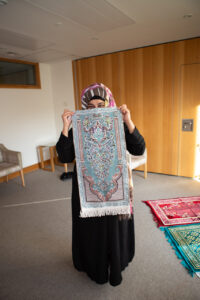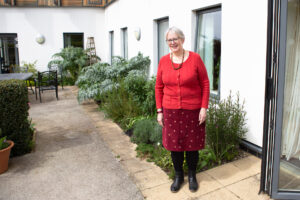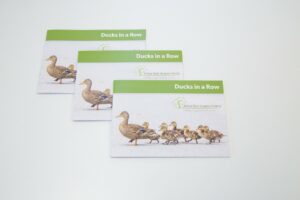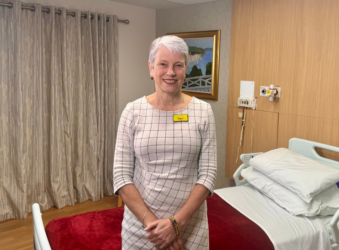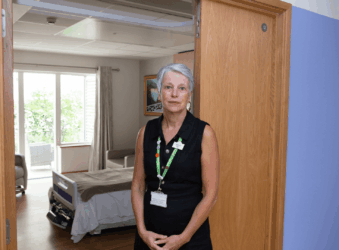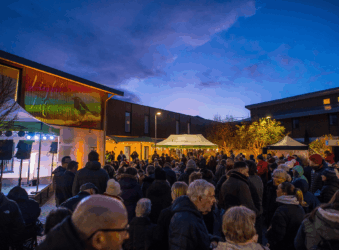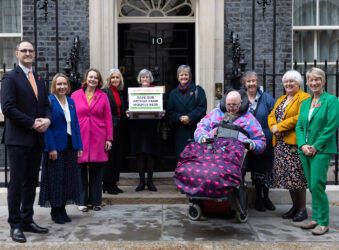The Culture of Dying Matters for patients at Arthur Rank Hospice Charity
Share this article

The theme of Dying Matters Week, from Monday 5 – Sunday 11 May 2025, is ‘The Culture of Dying Matters’.
It takes a special person to care for someone when they are dying or after they have died and Arthur Rank Hospice Charity have a whole team of them. Whether they are working in the Hospice, in the Inpatient Unit, at the Alan Hudson Centre in Wisbech or in the patients own homes, they always consider the individual’s needs and desires.
The Inpatient Unit
When patients are admitted to the Inpatient Unit, the patient or their loved ones are encouraged to complete a ‘Getting to know me document’. This helps the clinical staff to support the patient’s individual needs and interests. The information gathered includes:
• Any name you prefer to be called
• The person who knows you best
• Any professionals who support you at home
• Any communication difficulties
• Any eyesight or hearing requirements
• What work, travel etc you did in the past
• Your interests and hobbies
• How you like to relax
• Things that worry you (other than your illness)
• Your mobility
• Personal care
• Eating and drinking requirements
• People and things that are important to you
• How you manage difficult situations or crisis
• Your sleeping patterns
and any other information they would like to share.
Our Bistro
Our Bistro team offers a daily menu which includes vegetarian, vegan and gluten free options. If and patient or their visitors have a particular dietary requirement, such as a halal meal, we can prepare this for them.
Beliefs, prayer and reflection
The Charity cares for people of any faith or no faith and makes provision to support different cultures and beliefs. The Sanctuary, adjacent to the Bistro at the Hospice is a quiet, peaceful place for prayer or time alone. There is a prayer tree for people of all faiths to place their thoughts and prayers. Qibla is marked and prayer mats are available for Muslims to use. Resources such as scriptures and various faith prayer books are also available.
Farah Mogul, a Health Care Assistant who worked in the Inpatient Unit and now in the Hospice at Home Team shared her knowledge and experience about Muslim cultures and traditions:
“When a person of Islamic faith passes away the family and community follow Islamic funeral rites. The process begins with Ghusl (ritual washing) of the deceased, followed by Kafan (shrouding) the body in a white cloth.
The body is washed by close family members or individuals of the same gender and then placed on a clean elevated surface and covered to maintain dignity and modesty. The process involves washing the whole body respectfully with clean, lukewarm water.
After Ghusl, the body is dried with a clean towel and then wrapped in a white shroud called the Kafan.”
Caring for patients in the Community
Clinical Nurse Specialist, Lynn Begley, who works in the Hospice at Home team recounted a time when they were able to respect a family’s cultural tradition:
“We were caring for a man at home – his preferred place to die. The family practiced a Muslim faith and told us that after he died it was forbidden, in their culture, for a female to touch the body. Fortunately, we have male nurses in our team. After the patient had died we arranged for one of our male nurses, with the patient’s grandson to enable their wishes to be respected.”
Discussing wishes in advance
Knowing someone’s wishes before they die can be very reassuring for their loved ones but talking about death and dying can be very uncomfortable for some people, particularly if this has been a taboo subject in their family. One patient who visits the Living Well Service, shared her story:
“I had always been scared of dying – even as a young child. When I first started coming to the Hospice they held a session where we could talk about our thoughts, feelings and wishes around our death. At first, I couldn’t understand why they kept talking about it. One day I joined in, and now I don’t feel scared at all. I have made plans and I feel at peace with those.”
Olivia Burren, a Celebrant for over ten years, visited the Living Well Service to speak to patients there. She said it is helpful to the families if the person [who has died] has left instructions for their wishes after their death.
She shared a ‘Funeral Plan’ where people can complete different sections of their choice, for the funeral service, which include:
• Music to be played– specify the artist as well as the track and why you/they chose it
• Poetry or readings
• Some things about me/them: family, early life, school, job, hobbies, interests.
• Who has been important in your/their life
• Things you/they love(d)
• Things you/their dislike(d)
• A favourite place and time
• My/their proudest achievement
• The legacy I/they hope I/they have passed on
• I’d like you to remember me as ….
• My/their hope for the future after I’ve/they’ve gone
• Anything else e.g. People to wear a specific colour or dress code, I’d like a motorbike hearse, dove release etc.
She talked about the importance, to the grieving family, to be able to celebrate the lives of their loved ones, with the confidence of knowing they would have approved:
“Even if someone knows they are dying, it can still be a shock for the family. Having clear instructions about their wishes can be very beneficial at a time when they are grieving.”
One patient who attended the Living Well session returned the following week and shared:
“After the session I put a folder together with all my details, such as insurance etc. but also my funeral wishes, and I chose a song: ‘Who wants to live forever’ by Queen, as I’ve always been a Freddie Mercury fan. My daughter knows where the folder is and I try not to think about it all now.”
Are your Ducks in a Row?
The Charity’s Ducks in a Row booklet is a good place to start. There are different sections to complete, such as:
• Your Information – to include your next of kin, dependents, pets, close friends etc.
• Your life contacts – to include your key health contacts.
• Your documents – to include your birth certificate, driving licence, National Insurance numbers, NHS card, your Will etc.
• Your possessions and property section – to include mortgage or tenancy details, vehicles you own etc.
• Your contact section – to include work/voluntary contacts, home contacts, local traders (milk, newspapers, window cleaners etc.), organisation contacts (clubs, memberships etc.)
• Your finances – current and savings accounts, pensions, NS&I savings, regular payments, utility and key suppliers and accounts, insurance policies etc.
• Your final wishes – funeral plans, medical science, flowers or donations, after the funeral, special requests, special messages etc.
If you would like to know more about the Charity’s services please visit our website or telephone 01223 675777.
Related articles
-

Community support saves nine beds from imminent closure at Hospice
Charity says Protect Our Care campaign has ensured beds can remain open for a year, following £829,000 funding cut news...
-

Arthur Rank Hospice Announces News of ‘devastating’ funding cuts
Nine beds will close after £829,000 funding cut
-

Comfort and Light at Hospice’s ‘Light up a Life’ Celebrations
Light up a Life brought the community together to remember loved ones
-

Hospice patient, loved ones and supporters deliver 15,500 signatures
Lisa, Vivien, Valerie and Rick deliver 15,500 signature to Protect Our Care with local MP’s
